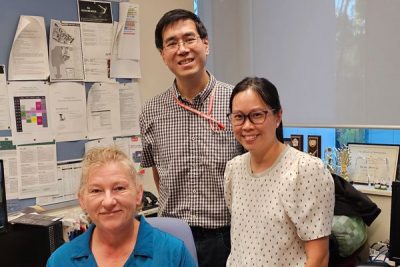Using AI to identify aspiration in children with feeding disorders
Caboolture Hospital clinicians will soon use artificial intelligence to help diagnose swallowing impairment and aspiration in children during routine mealtime observations.

Dr Belinda Schwerin, Dr Stephen So and Adj Assoc Prof Thuy Frakking
Adjunct Associate Professor Thuy Frakking and her team received Caboolture Hospital’s first Medical Research Future Fund (MRFF) grant of more than $156,000 to undertake the work.
Aspiration, when food or fluids enter the airway, can lead to serious short and long-term disease in children.
Current assessments, such as an x-ray swallow for aspiration are limited by reduced availability and involve the use of radiation.
As a practising paediatric speech pathologist, Adj Assoc Prof Frakking was frustrated by the lack of objective and readily repeatable assessments that did not involve radiation exposure for children.
Initially funded by a Metro North Clinician Researcher Fellowship, Adj Assoc Prof Frakking dedicated time to exploring how the swallowing sounds collected during her PhD could be adapted with the latest machine learning techniques to accurately diagnose swallowing impairment and aspiration.
Through networks facilitated by Metro North Health, she teamed up with Griffith University Electrical and Electronic Engineers Doctors Belinda Schwerin and Stephen So to see what was possible. Their initial work saw 100 per cent precision in the detection of swallowing impairment and aspiration in children.
Dr Frakking said the MRFF grant funding would allow the team to adapt their developed algorithm to suit swallow sounds collected in clinical environments where there are more noises to work with.
“The development of an accurate algorithm to classify aspiration in children will help progress to the development of an app that families and clinicians can access worldwide without the need for x-ray swallows,” Dr Frakking said.
“This is exciting, particularly for children and families where access to paediatric x-ray swallows is not available, including Metro North Health facilities such as The Prince Charles and Redcliffe Hospitals.
“This Level 1 funded scheme will help support the recruitment of research higher degree students and speech pathologists to Caboolture Hospital – helping to build our research capacity and capability within our directorate.”
The project research team comprises a multidisciplinary team of clinicians and academics helping to apply their expertise towards the development of a successful algorithm: Adj Assoc Prof Thuy Frakking (Caboolture Hospital), Dr Belinda Schwerin (Griffith University), Dr Stephen So (Griffith University), Assoc Prof Christopher Carty (Griffith University), Assoc Prof Kelly Weir (Melbourne University), Prof Michael David (M&M Statistical Consulting), and Prof Anne Chang (QUT).
